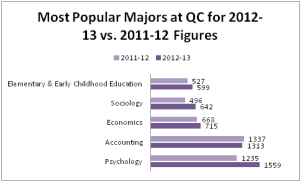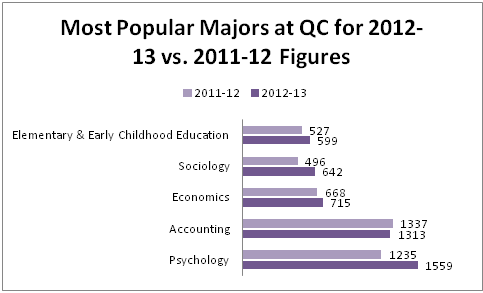
As the spring semester begins, students are choosing their majors and aiming to graduate on time. All of the students, however, wish to have a good job waiting for them once they complete school.
Queens College students are no different as it had a total enrollment of 20,100 students, according to the QC 2012-13 Fact Book.
However, the current economic crisis has lead students to work jobs that pay little and require no college degree. People who hold those jobs, despite having a college degree, are deemed “underemployed.”
A “good job” is defined, according to the Center for Economic Policy and Research, as a job providing at least $19 per hour, health insurance by the employer and a retirement plan.
A May 2013 survey by McKinsey and Company reported 58 percent of college graduates had a job requiring a four-year degree. Specifically, 55 percent of public college graduates stated the same compared to 66 percent of graduates at private colleges.
“It’s tough,” Randi Gutbrod, a 19-year-old sophomore said. “It’s especially tough for one living with their parents. My parents are struggling with their own mortgage and expect me to help out, which is fine, except if all of my money goes to surviving in the present [then] there is nothing left to save for the future: to move out, lessen my own student debt, support my own family. It’s the downward slope of a vicious cycle.”
According to a Jan. 2014 report by the Economic Policy Institute, there were 2.7 people per job opening. They also found that every industry had more unemployed workers than job openings based on data from Dec. 2012 to Nov. 2013.
Moreover, an annual report on that year’s graduating class by EPI found college graduates entering a fragile labor market due to “weak demand for goods and services.” Hilary Wething, an economist with EPI and co-author of the report said “young workers have been slammed” since the 2007-08 financial crises.
“Across the board for workers, employment prospects, regardless of the occupation, have really been bleak. This overall job loss is systemic of the downturn,” she said.
One aspect of the report was how graduating during a downturn had “long-term consequences.” The Class of 2013 will be the fifth consecutive class with “reduced earnings, greater earnings instability and more spells of unemployment” for the next 10 to 15 years compared to an economy with numerous job opportunities. Wething called this effect “scarring,” as graduates are significantly affected especially considering they aren’t eligible for any safety net programs like unemployment insurance.
“That scarring phenomenon will continue to happen. Not just because they won’t get a job in their intended field or a job, period, but because of their loss in their earnings from not getting on the bottom rungs of their career ladder,” she said.
Gutbrod said she would wish to work in a nonprofit, though also felt politics was another field she could enter as she double majors in both political science and economics.
Deciding on a major can influence whether a well-paying job will be offered to a college graduate. According to a Jan. 2014 New York Federal Reserve report, engineering, education, health, math and computer science were the majors where graduates likely held a job with a degree. Conversely, liberal arts, business, social science and communications majors had more people in jobs without one required.
“I do think there will be a paying job when I graduate, but not because of my education. It has less to do with my degree and more to do with initiative and experience. I’ve been trying to gain as many honors as possible to color my resume. I’ve also made a very conscious decision to search for internships as early as possible and not quit sending my resume until one was landed,” Gutbrod said.
At QC, for the 2012-13 school year, the most popular major was psychology with 1,559 students. Accounting and economics was respectively the second and third most popular major. For the 2011-12 year, accounting was the most popular at 1,337, followed by psychology and elementary & early childhood education.
The situation has been called a crisis for young workers, but Wething believes people can still actively alter the situation through policy changes. Additionally, she mentioned by going to college, students are increasing chances of higher pay compared to high school graduates.
“Don’t lose hope,” she said. “I’m optimistic. For an individual student, going to college is, on the whole, still a good investment.”














